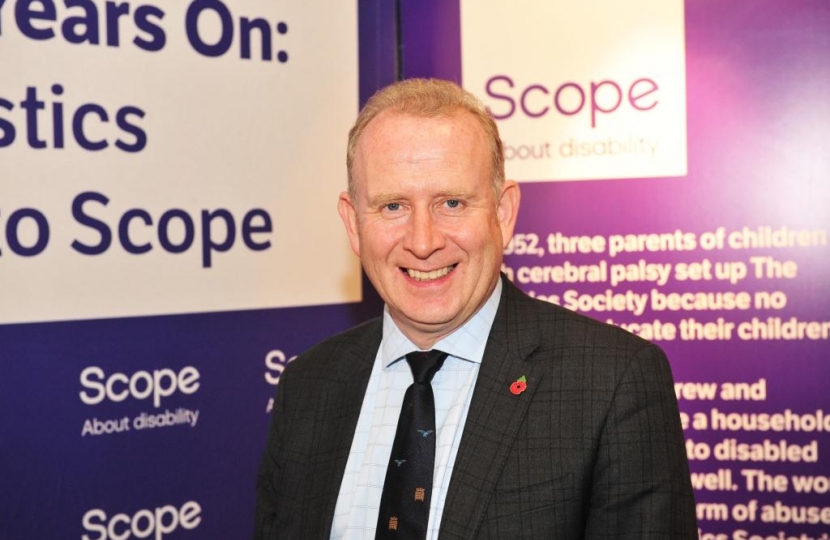
Graham Evans MP attended a parliamentary event on Monday 24th November to mark the twenty year anniversary of charity Scope changing its name from The Spastics Society.
Graham Evans MP was joined by assembled Ministers for Disabled People from this important period, including Rt. Hon William Hague MP and Mark Harper MP, the current Minister, to celebrate this important milestone in the organisation’s history.
Scope took the decision to change its name from The Spastics Society in 1994 because the word ‘spastic’ had become a common term of abuse for disabled people.
At the event, the charity exhibited many of the iconic publicity and campaigns materials that it has used to challenge attitudes to disability over the past twenty years.
William Hague MP, the Minister of State for Disabled People at the time of the name change, spoke clearly of his recollections from the time of the name-change launch event in 1994. He also reflected on the passing of the Disability Discrimination Act during his time as Minister, a landmark that he still regards as one of his proudest achievements in Government.
Graham Evans MP said: “I was delighted to attend Scope’s Parliamentary reception to recognise the twenty year anniversary of its name change from The Spastics Society.
“Improving attitudes towards disabled people in Britain remains incredibly important.
I’m pleased to support the work that Scope does to challenge negative attitudes towards disabled people and to make this country a place where disabled people have the same opportunities as everyone else.”
Latest research by Scope reveals that six in ten disabled people believe that public attitudes to disability have improved in the last twenty years.
Scope’s chief executive, Richard Hawkes, says that there is still much work to be done to increase public understanding of disability: “Scope was set up over sixty years ago, when three parents of disabled children couldn’t find a school to educate their children.
Twenty years ago The Spastics Society changed its name to Scope, because the word “spastic” had become a term of abuse.
Since then, we’ve seen huge steps forward, like the Disability Discrimination Act, Equality Act and the hugely successful Paralympic Games in 2012.
Disabled people’s aspirations are higher than ever before. But public attitudes still have a long way to go. Many disabled people continue to face negative attitudes, in the playground, in the street, and from employers. Often it’s because people feel awkward around disability. Not enough people know a disabled person, or know enough about disability.
In 2014 the challenge is to keep pushing for change so that disabled people can continue to play a greater role in society and be more and more visible in all aspects of daily life.”
